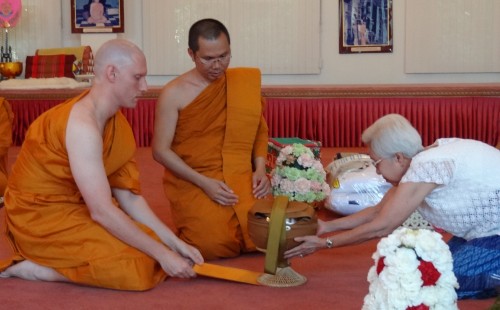How to Become a Thai Monk: Preparation, part 1 Posted by palmisano on Oct 12, 2013 in Culture
[This article is a continuation of a series of articles on becoming a Thai Buddhist monk.]

After you’ve qualified and learned the basic rules to becoming a Buddhist monk, you then can be ordained. Ordination isn’t an easy task and can be as complicated and time consuming as preparing for a wedding.
Your very first task should be to find a supporting monk who is willing to help you with every step, prepare you and help you practice, and answer all your questions. You will become his responsibility. Ask him everything there is about being a monk, such as sleeping schedules, eating etiquette, and if monks wear underwear underneath those robes . . .
(they don’t)
A personal interest of mine was to use this monkhood opportunity to improve my Thai-speaking skills and to learn religious-specific vocabulary. So I made sure to ask my sponsoring monk to teach me the ‘monk language’ – monks use a lot of specialized vocabulary that laymen don’t. I’ll go over this in a later article.
After you have your sponsor, you will need to memorize about a page-long ancient Bali chant as part of the ordination ceremony. In this chant you are declaring your intention to become a monk, making various promises, saying you aren’t a demon or other non-human posing as a human, etc. You can expect it to take about 20 hours of effort to memorize if you can read Thai, or more if you can’t. While the chant can be found online in English, you must pronounce it like a Thai person does as monks must be perfect and flawless. Mis-pronunciation is frowned upon.
Note: By accurate pronunciation, I mean pronounce the ancient Bali like a Thai person does. But the way Thai’s pronounce ancient Bali is about as accurate as most foreigners pronounce Thai. I digress . . .
The first paragraph to memorize is the hardest, but afterwards it gets easier as there is a lot of repetition throughout. It took me about a month to memorize it all, but I took it easy and didn’t spend much time per day.
There are two different versions of the ordination chant, and the one you must memorize depends on the preference of your temple. Your sponsoring monk will tell you which. The one I performed was เอสาหัง ehM saaR haangR. See youtube for audio examples.
The other version is almost exactly the same, but requires a different pronunciation of the same words.
Even if you can already read Thai, don’t start memorizing it on your own until you’ve heard the way it’s supposed to be chanted. I made this mistake, thinking it should be a monotone chant like the other chants, but it isn’t. It took me a wasted day to internally relearn it. I also noticed different monks chant it differently, as you probably realized by watching the various youtube videos.
During the ordination ceremony, there are certain parts where you must repeat what the monk says. All of this you will need to practice and memorize before the ceremony – it’s too long and difficult to repeat on the spot. During my ceremony, the lead monk chanted these sections differently than how my sponsoring monk had me learn it. To avoid getting myself confused and flustered, I ignored the way the lead monk said it and just went with how I practiced it. If you find yourself in this situation, it might sound strange/rude to be saying it differently, but it’s better than making mistakes and having to start over. And they will make you start over if you badly mess up!
Most Thais when they are ordained mess up during the chant. But if you don’t show any voice or facial sign when you mess up, only the monks paying attention will notice. Just repeat the sentence and act as if no mistake was ever made. The monks will whisper any part to you that you forget or mess up, too.
My sponsoring monk said when he was ordained that he had to repeat it three times because he kept messing up. Ironically, he was also the monk which memorized the 227 rule chant . . .

Build vocabulary, practice pronunciation, and more with Transparent Language Online. Available anytime, anywhere, on any device.




Comments:
Austin:
It’s Pali, the Prakrit language that the Buddha used and the liturgical language of Theravada Buddhism. Bali is a place in Indonesia. This is maybe confusing because Thais pronounce the word Pali with an voiced, aspirated “B” sound or บ.